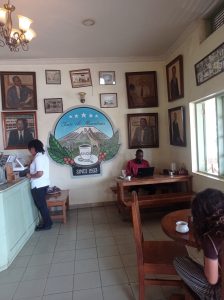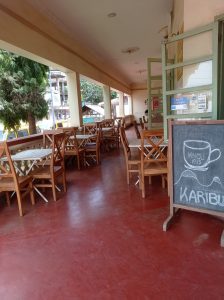March, 2025 - Update #6
Small stories from Arusha 6
Networking Rules!
The second-to-last training day of the two-week FSEA mentoring course. Behind us are over one and a half weeks of intensive training, and it’s definitely been quite a workload for both participants and trainers. I myself am in a kind of researcher-trainer-free agent role, which is actually quite nice. No major responsibilities…
That comes with the perk that I spent yesterday afternoon as a tourist. Arusha has a fair number of nice restaurants, but especially some excellent cafés. This city — and perhaps all of Tanzania — is truly a coffee culture country. Coffee is grown here, and even next to our residence there are coffee bushes. Still, walking around isn’t very appealing: the sidewalks are in poor condition, if they exist at all, and cars and other motorized vehicles zip past pedestrians, nearly brushing against them. There was one kind motorcyclist who slowed down when I was crossing the street — which of course earned him a chorus of honks from the other drivers.


Photos: In the town of Moshi and having coffee at Coffee Union Café (recognized by every tourist guide).
The café was established in the 1930s by a cooperative of small-scale coffee producers. Just lovely.
I’ve promised to help plan and partially implement the project’s evaluation and research. As part of that, I’ve conducted group interviews with the mentors about their expectations, challenges, and perceptions. It’s fascinating how many things are exactly the same all over the world. But there are also some interesting local aspects: thanks to computers, students who might otherwise stay home are coming to school. The number of dropouts is decreasing — if digital tools make learning more engaging for students and keep them in school, that’s wonderful. In Finland, that probably wouldn’t work anymore.
The mentors in the training will surely face many challenges in their upcoming roles, starting with much more limited infrastructure than we’re used to in Finland. But one thing is working quite well: several mentors are being trained from both of the secondary schools involved, and tight-knit mentoring teams have already formed among them. Their subjects range from math and English to chemistry and biology, so they can keep in contact both within their schools and across the schools with colleagues who teach the same subjects. Not everything has to be done alone — learning materials can be shared, and support can be asked from a fellow teacher. Networking is a powerful support. All the teachers know sign language, and there are also sign language interpreters in the schools who have special education training. So inclusive teaching is at least a bit easier.
Liisa Ilomäki